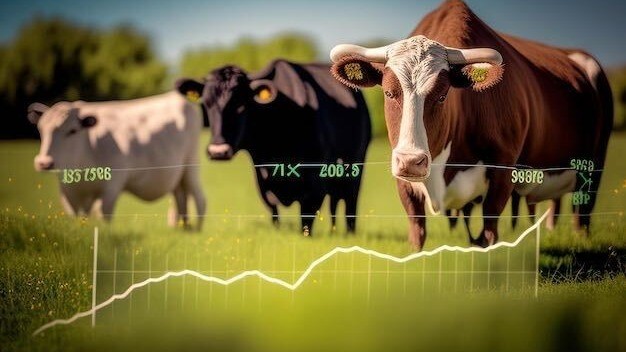Developing an AI-Driven Supply Chain in the Meat Processing Industry: Anna von Zeppelin Turvoll CEO Völur

The meat processing industry operates within a complex supply chain, spanning from farms to retail shelves. As we approach 10 billion inhabitants of the planet by 2050, and developing nations increase their consumption of protein, growing concerns about environmental sustainability, resource efficiency, herd reduction regulation and profitability have driven the adoption of advanced technologies. Among these, artificial intelligence (AI) has emerged as a transformative tool, offering solutions that optimize operations while reducing waste and greenhouse gas (GHG) emissions. By developing an AI-driven supply chain, the meat industry can address operational inefficiencies, improve profitability, and contribute meaningfully to global sustainability goals.
AI in the Supply Chain: Key Applications
AI technologies bring a host of innovative applications to the meat processing supply chain, including precision farming, optimized processing, efficient logistics, and smart retailing.
- Farm Level:
AI-powered tools help farmers monitor livestock health, optimize feeding, and adopt regenerative practices. Precision feeding algorithms, for instance, ensure animals receive tailored diets, reducing methane emissions from digestion and improving growth rates. Additionally, AI systems that analyze satellite and soil data encourage sustainable land use and carbon sequestration, minimizing the environmental footprint of farming operations.
2. Processing Plants:
At the processing stage, AI technologies optimize resource use, maximize yields, and reduce waste. Smart cutting systems analyze carcasses in real-time, enabling precise segmentation and ensuring high-value cuts are maximized. AI also supports waste minimization by repurposing by-products for secondary markets, such as pet food or biofuels, contributing to a circular economy. Furthermore, predictive maintenance systems powered by AI improve equipment efficiency, reduce downtime, and lower energy consumption.
3. Logistics:
AI-driven logistics systems streamline the transportation of meat products by optimizing routes and maximizing truck capacity. These solutions reduce fuel consumption and emissions while ensuring timely deliveries. Additionally, cold chain monitoring systems use AI to maintain refrigeration efficiency, preserving product quality and minimizing energy waste.
4. Retail:
In retail, AI enhances demand forecasting, inventory management, and product traceability. Retailers can predict consumer purchasing patterns to avoid overstocking, which reduces food waste. Blockchain-enabled AI systems provide transparency, allowing consumers to trace products from farm to shelf, fostering trust in sustainability practices.
Impacts on Profitability
An AI-driven supply chain enhances profitability by reducing costs, improving operational efficiency, and unlocking new revenue streams. • Yield Optimization: Precise cutting and processing ensure that plants extract maximum value from every animal, increasing revenue per unit. • Cost Savings: By minimizing energy use, water consumption, and material waste, AI reduces operating costs at multiple supply chain stages. • Market Alignment: AI predicts market demand trends, enabling producers to align output with consumer preferences, avoiding overproduction and inventory losses.
These advancements make operations leaner and more competitive, driving long-term financial success.
Advancing Sustainability
AI technologies also address critical sustainability challenges in the meat industry. • Emission Reductions: Precision feeding, optimized logistics, and energy-efficient processes significantly lower methane and carbon dioxide emissions across the supply chain. With consumers leading retailers in their shelf choices, Scope 3 emissions and upstream improvements need to continue to be made. • Resource Efficiency: AI enables smarter use of water, energy, and raw materials, reducing waste and environmental impact. • Food Waste Reduction: Improved forecasting and inventory management ensure products are sold and consumed before expiration, curbing unnecessary waste.
These sustainability benefits position companies to meet stringent environmental regulations and align with consumer demands for eco-friendly products.
The Future of Meat Processing
As the global meat industry faces increasing scrutiny, AI-driven supply chains offer a path forward that balances profitability with environmental responsibility. By investing in AI technologies, companies can achieve greater operational efficiency, reduce their carbon footprint, and unlock new opportunities for growth.
In an era where sustainability and profitability are no longer mutually exclusive, the adoption of AI-driven supply chains ensures the meat processing industry remains resilient, competitive, and aligned with the values of modern consumers.
*For further reading and perspectives - 'Emissions from grazing systems'

.svg)
.png)